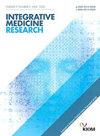Navigating uncertainty in evidence-informed decision-making for traditional, complementary and integrative medicine: An updated critical interpretive review
IF 3
4区 医学
Q2 INTEGRATIVE & COMPLEMENTARY MEDICINE
引用次数: 0
Abstract
Background
Evidence-informed decision-making (EIDM) presents unique challenges for traditional, complementary and integrative medicine (TCIM). To aid decision-making, a critical interpretive review was updated to examine how internationally and nationally endorsed consensus statements on guideline development and policy briefs, along with TCIM-specific recommendations may address these challenges.
Methods
The review drew on critical interpretive synthesis and rapid review methods. PubMed, CINAHL and AIMED were searched on 19 January 2024. Single reviewers conducted the screening and extracted descriptive data. Analysis began deductively from the original review themes and developed iteratively.
Results
Included were 167 publications. Over the past decade, evidence-to-decision (EtD) frameworks have considered a broader range of modifying factors (e.g., importance of the problem, stakeholder preferences, feasibility, costs, health equity, human rights, social impacts) that may warrant making a stronger recommendation despite lower certainty evidence, and vice versa. Additional strategies proposed by TCIM guideline developers included systematically incorporating multiple evidence sources and developing TCIM extensions for reporting guidelines. Four interrelated themes affirmed the importance of 1) transparent and inclusive decision-making, 2) ensuring the scope and framing of the problem are sensitive to TCIM contexts, 3) using diverse types of evidence in EtD frameworks and when there is evidence uncertainty, and 4) centering equity, including epistemic equity, throughout the EIDM process.
Conclusion
Advancing EIDM methodologies specifically for TCIM guideline development and policy can help decision-makers navigate evidence uncertainty to support the appropriate integration of TCIM into global health systems.
Protocol registration
International Platform of Registered Systematic Review and Meta-analysis Protocols: INPLASY202510066.
在传统医学、补充医学和中西医结合医学的循证决策中导航不确定性:一项最新的批判性解释性综述
基于证据的决策(EIDM)对传统医学、补充医学和中西医结合医学(TCIM)提出了独特的挑战。为了帮助决策,更新了一份重要的解释性综述,以研究国际和国家认可的关于指南制定和政策简报的共识声明,以及tcim的具体建议如何应对这些挑战。方法采用批判性解释综合法和快速综述法。PubMed、CINAHL和aims于2024年1月19日检索。单一审稿人进行筛选并提取描述性数据。分析从最初的审查主题开始演绎并迭代发展。结果共纳入167篇文献。在过去十年中,从证据到决策(EtD)框架考虑了更广泛的修正因素(例如,问题的重要性、利益攸关方偏好、可行性、成本、卫生公平、人权、社会影响),尽管证据的确定性较低,但这些因素可能值得提出更强有力的建议,反之亦然。TCIM指南制定者提出的其他策略包括系统地合并多个证据来源和开发报告指南的TCIM扩展。四个相互关联的主题肯定了以下方面的重要性:1)透明和包容性决策;2)确保问题的范围和框架对TCIM背景敏感;3)在EtD框架中使用不同类型的证据,以及当存在证据不确定性时;4)在整个EIDM过程中以公平为中心,包括认知公平。结论:针对TCIM指南制定和政策推进EIDM方法可以帮助决策者应对证据不确定性,从而支持将TCIM适当整合到全球卫生系统中。方案注册国际系统评价和荟萃分析方案注册平台:INPLASY202510066。
本文章由计算机程序翻译,如有差异,请以英文原文为准。
求助全文
约1分钟内获得全文
求助全文
来源期刊

Integrative Medicine Research
Medicine-Complementary and Alternative Medicine
CiteScore
6.50
自引率
2.90%
发文量
65
审稿时长
12 weeks
期刊介绍:
Integrative Medicine Research (IMR) is a quarterly, peer-reviewed journal focused on scientific research for integrative medicine including traditional medicine (emphasis on acupuncture and herbal medicine), complementary and alternative medicine, and systems medicine. The journal includes papers on basic research, clinical research, methodology, theory, computational analysis and modelling, topical reviews, medical history, education and policy based on physiology, pathology, diagnosis and the systems approach in the field of integrative medicine.
 求助内容:
求助内容: 应助结果提醒方式:
应助结果提醒方式:


